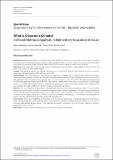What is Classroom Climate? A Mixed-Methods Analysis in Elementary Education in Vaud.

Type de référence
Date
2024Langue de la référence
AnglaisEntité(s) de recherche
Résumé
Background: Classroom climate is vital for success and well-being at school. Its development is also on the inclusion and sustainability education policies agenda in the canton of Vaud, Switzerland. However, few studies have docu-mented how well pupils understand it in this context, especially using mixed methods. Objective: This study aims to present the results of elementary school students' understanding of the classroom cli-mate in the canton of Vaud. Sample: The sample comprises two classes of students in the elementary education levels 5-6H and 7-8H, followed over four measurement periods between January 2021 and December 2021. Methodology: The methodology is mixed and involves two different types of data collection: quantitative collection, with the School Environment Questionnaire (SEQ) administered at four points in time, and qualitative data collection, with focus groups carried out with the same students at times T2 and T4. The theoretical model used for the classroom climate is built around five dimensions: Relational, educational, safety, justice, and belonging (Janosz et al., 1998). Descriptive and correlational analyses were carried out on the quantitative data. For the qualitative analysis, the delib-erative inductive logic categorization method was used. Results: Regarding modeling the classroom climate, cross-analysis of quantitative and qualitative data reveals unprec-edented associations around the relational dimension, which appears very significant in reading the school experience. This dimension refers to different sub-dimensions, depending on whether it concerns the student-student relationship (associated with the dimensions of safety and belonging) or the teacher-student relationship (associated with the di-mensions of justice and educational framework related to rules). Conclusions: These results make it possible to focus on the issue of relationships in understanding the classroom climate, highlighting teaching practices relevant to students, relating to the ways of exerting justice in the classroom, and the construction of relationships between peers. They highlight the need to strengthen the role of these objects in teaching-learning activities at school.Titre du périodique
Progress in Science Education (PriSE)Evaluation par les pairs (peer reviewing)
ouiPortée nationale / internationale
internationaleVolume / tome
7Fascicule
3Pagination
6-21URL permanente ORFEE
http://hdl.handle.net/20.500.12162/7825Autre(s) URL(s) permanente(s)
http://doi.org/https://doi.org/10.25321/prise.2024.1525La publication existe uniquement sous forme électronique
ouiDocument(s) associé(s) à la référence
Texte intégral :
Fichier
Accès
Commentaire
Version
Taille
Autre(s) document(s) :
Fichier
Accès
Commentaire
Taille
- Tout ORFEE
- Détail référence



